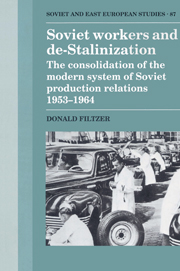 Soviet Workers and De-Stalinization
Soviet Workers and De-Stalinization Book contents
- Frontmatter
- Contents
- List of tables
- Preface and acknowledgements
- List of terms and abbreviations
- Introduction: the contradictions of-Stalinization
- Part I Labour policy under Khrushchev: issues and results
- Part II De-Stalinization and the Soviet labour process
- Conclusion
- Notes
- Bibliography
- Index of industrial, mining, and construction enterprises
- General index
- Soviet and East European Studies
Preface and acknowledgements
Published online by Cambridge University Press: 29 January 2010
- Frontmatter
- Contents
- List of tables
- Preface and acknowledgements
- List of terms and abbreviations
- Introduction: the contradictions of-Stalinization
- Part I Labour policy under Khrushchev: issues and results
- Part II De-Stalinization and the Soviet labour process
- Conclusion
- Notes
- Bibliography
- Index of industrial, mining, and construction enterprises
- General index
- Soviet and East European Studies
Summary
This book is a follow-up study to my earlier work, Soviet Workers and Stalinist Industrialization (London and Armonk, NY, 1986), which examined the position of the Soviet working class during the formative years of the Stalinist system and the origins of modern Soviet production relations. The underlying theoretical premises of the two works are the same, namely that the atomized position of the individual worker within society and at the workplace has limited the means available to workers for defending their position against management and the ruling elite. Essentially, workers are confined to individual responses, in particular the exercise of considerable control over the way in which they execute their labour power, and this, in my view, has become a fundamental source of crisis in the Soviet system. Indeed, the problem facing Gorbachev and the market reformers in today's USSR is precisely how to change the workers' relationship to the labour process, forcing them to cede greater power to management. This is a complex argument which I elaborate in considerable detail in chapter 5 and the conclusion.
From the point of view of the consolidation of the USSR's underlying system of production, the Khrushchev period plays a crucial role. Stalin's successors were all keenly aware that the continued domination of society by the secret police and rule by terror was incompatible with any attempts to extract the country from the economic impasse into which the Stalinist system had finally led it after World War II. The question facing the elite was how to motivate the population to put in greater effort at the workplace without actually ceding political power and its control over society.
- Type
- Chapter
- Information
- Soviet Workers and De-StalinizationThe Consolidation of the Modern System of Soviet Production Relations 1953–1964, pp. xi - xiiiPublisher: Cambridge University PressPrint publication year: 1992
- 1
- Cited by
